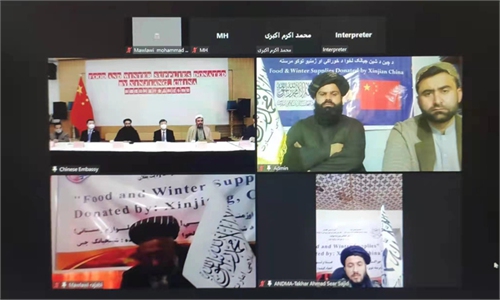
Intel CEO Brian Krzanich delivers a keynote address named "Experience the Power of Data" at the media day of Consumer Electronics Show (CES) in Las Vegas, the United States, Jan. 8, 2018. (Xinhua/Li Ying)
US tech company Intel has sparked outrage across Chinese social media, following the company's recent statement requiring all its supplies not to source goods or services or use labor from Northwest China's Xinjiang Uygur Autonomous Region, due to fabricated accusations of "forced labor" in the region.
Analysts said Intel's discriminative stance against Xinjiang, coming at a time when the US government intensified crackdown on Chinese technology companies, is a calibrated "cunning" move that aims to please US government, while the move will only cause limited harm to its business.
But, some analysts warned that Intel's discrimination against China's Xinjiang region will backfire among Chinese customers and end users, and taint its international image, adding the move will eventually take a toll on Intel's sales in China, its largest source of business revenue.
Chines netizens' tsunami of anger was reflected in the comments left on Intel's Chinese Weibo account, with the majority of them demanding Intel apologize and clarify its statement about Xinjiang.
One of the comments with the most likes under Intel's latest posting said when the company needs the revenues from the Chinese market it behaves in a polite manner, but the US company chose to "stab" them in the back.
"I am not going to use Intel products from now on, due to your false position on Xinjiang," a netizen commented on Intel's move on Weibo on Tuesday. "Intel must apologize".
According to a policy statement released by Intel earlier this month, the company alleged that "multiple governments have imposed restrictions on products sourced from the Xinjiang Region. Therefore, Intel is required to ensure our supply chain does not use any labor or source goods or services from the Xinjiang region," while stressing that the company prohibits "the use of any human trafficked labor, such as forced, debt bonded, prison, indentured or slave labor".
Intel declined to comment when contacted by the Global Times on Tuesday.
"Intel is playing a double game. Its stance can be viewed as political posturing to score political points among anti-China politicians in the US," Tian Yun, a Beijing-based economist, told the Global Times on Tuesday, noting that as Xinjiang's main products are agricultural goods and photovoltaic products, its stance is unlikely to shake its supply chain.
Ma Jihua, a Beijing-based veteran industry analyst, said that the reason why Intel dares to buy into a fabricated human rights accusation is that "the US high-tech company thinks Chinese firms are dependent on its semiconductor products."
"Intel thought that China would refrain from taking action against it. But we will wait to see the Chinese market will eventually teach the US company a lesson in the coming months," Ma told the Global Times.
China has remained to be Intel's top revenue generator since 2015, according to its annual financial statements.
Intel's extensive business in China not only covers semiconductor supply to Chinese customers but also includes business-to-consumer activities such as servers and computers.
"As its image dives to the lowest point, Intel sales in China would see a drastic drop later, with Chinese chipmakers being inspired to make more breakthroughs," Ma said.
Analysts said that Intel's competitors such as Qualcomm have done a better job in forging closer ties with Chinese market players.
Intel apparently bowed to pressure from the anti-China US politicians, analysts say.
In July 2021, a US politician took the claims about the Xinjiang issue to force Airbnb, Coca-Cola, Intel, Procter & Gamble and Visa to take a hardline stance on Xinjiang, but only an Intel executive reportedly believed the US government's accusation that "forced labor" was used in Xinjiang.
In 2020, Intel generated $20.26 billion from the Chinese mainland and Hong Kong market in total.
China's Foreign Ministry announced sanctions on four Americans as a tit-for-tat countermeasure against US government sanctions of four Chinese officials over so-called "human rights violations" in Xinjiang, Chinese Foreign Ministry spokesperson Zhao Lijian said on Tuesday.
The countermeasures include banning the above-mentioned four persons from entering China, including the Chinese mainland, Hong Kong and Macao, freezing their property in China, and prohibiting Chinese citizens and institutions from trading with them.
Zhao pointed out that the US has no right or qualification to interfere in China's internal affairs, and the US should withdraw the so-called sanctions imposed on Chinese officials.



